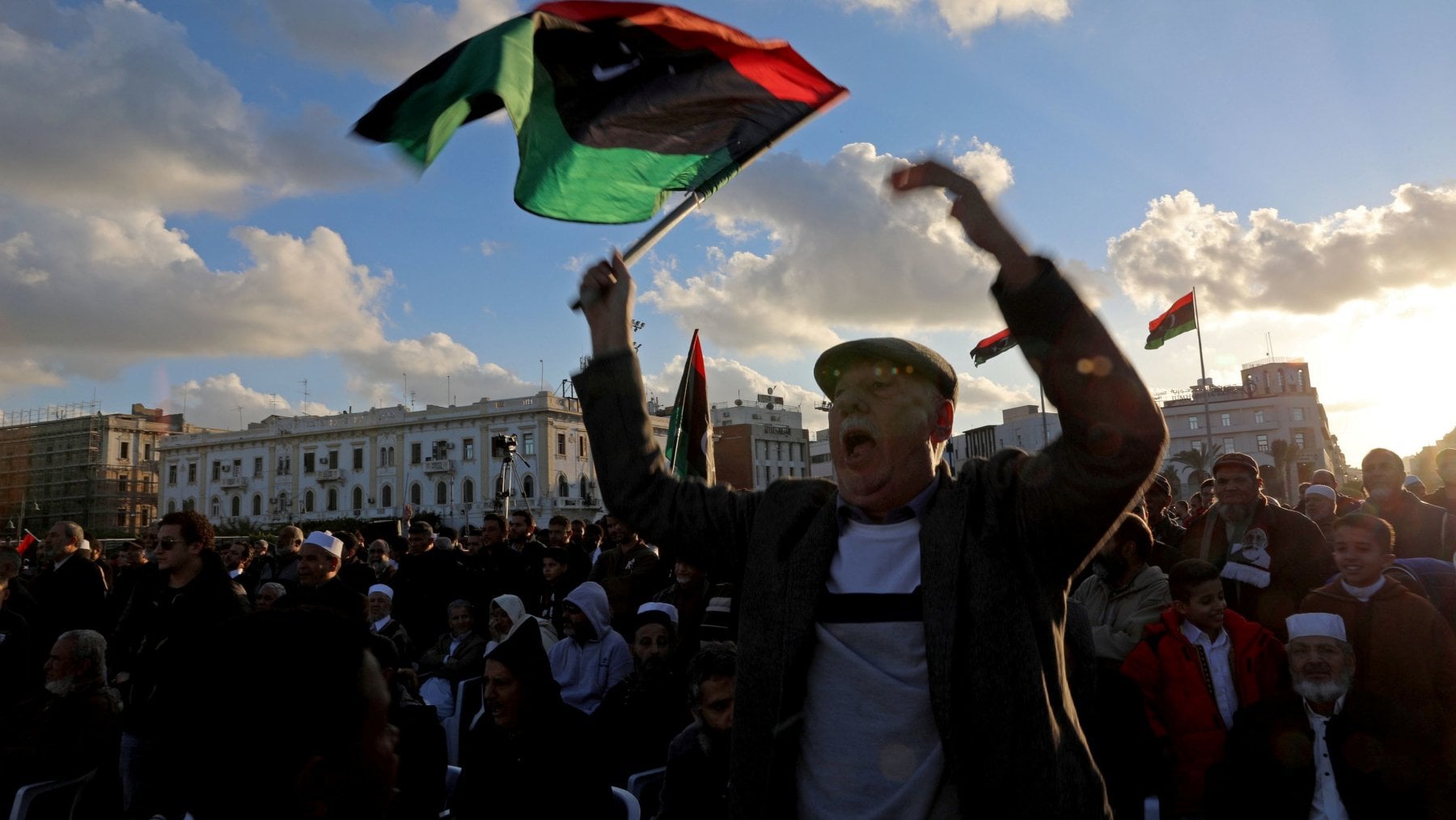By Irina Tsukerman
Open Conflict: Is Libya an Extension of the Syria War?
Russia, Iran, and Assad relationship status: It’s complicated
Despite the warnings by the US government, not only is the ongoing proxy conflict real, but it is open. Turkey-backed reinforcements from Damascus are continuously flying into Benghaz through Latakia. No less concerning is the fact that Russia appears to shift to the same strategy, allegedly importing fighters from a friendly pro-Assad militia to back Hafter’s effort. This development may further escalate the conflict. First, the transfer of pro-Assad fighters further diffuses a splintering conflict, and entrenches the growth of Russia’s influence in this and other Middle Eastern conflicts. Second, although Abu Dhabi has come to terms with Assad remaining in power, and even reopened its embassy in Damascus, in a clear attempt to try to sway Syria away from Iranian influence and over time, to help normalize relations with the Arab League, this could still develop into a more serious security issue on the ground. It is unclear to what extent this militia is infiltrated with directly pro-Iranian interests. The situation is further complicated by the complex dynamics between Russia, Iran, and Assad.
The impasse has allegedly reached the brink of an open conflict through a war of words in the media between the two states; rumors have been flying that US and Russia are even finding common ground in agreeing to remove Assad from power. This comes amidst Rami Makhlouf’s (Bashar Assad’s powerful cousin) fall out of favor; Russians indicated that they might view Makhlouf, equally popular within the Alawite community, as an alternative to Assad. For now, however, there is no evidence that Russia has taken any concrete action to boost Makhlouf or any other candidate; these comments may be nothing more than an attempt to pressure Assad to end the stalemate over political demands issued by Russia and the international community. On the contrary, the use of a pro-Assad militia in Libya indicates the following: 1) Assad feels increasingly confident in his hold on power and the country 2) the conflict with Russia is largely cosmetic, and both parties are essentially stuck with each other and 3) whatever the underlying tensions, Russia is not only not abandoning the alliance but indirectly signaling the international community that Assad is supporting Russia and its interests in Libya, and that in turn, Russia is issuing a voice of confidence for the regime.
Whether or not Iran will take advantage of this situation to join in the fray is not clear. For now, there is no compelling reason for Tehran to do so, while it is also drawing scrutiny and criticism over its activities in the Middle East, battling the COVID-19 pandemic, and being increasingly challenged by Israeli and other air force strikes in Syria. Furthermore, should Iran extend its presence actively to Libya, it would certainly not side with KSA and either keep to its own agenda, staying out of the main conflict, or join Turkey to some limited extent at the risk of angering Russia. Direct participation for Iran in Libya would be complicated by the likelihood of angering Egypt, which up until this point did not see Iran as an existential priority; UAE, KSA, and others would likely not take to it kindly. The best that Iran can do in this situation is gather intelligence through its various part-time allies, and perhaps find a niche for expanding Hezbullah presence and perhaps the inclusion of Iranian officers in some “advisory” capacity, depending on how the conflict unfolds, and whether Russia and Turkey ever patch up their differences.
Syria Conflict Gets A New Lease on Life in Libya
If there is any truth to this story, this raises the question of how much of the Syrian conflict is actually being relitigated in Libya.
In other words, the war in Libya is becoming to a large extent no only the battle for control between KSA/UAE/Egypt/LNA vs. Turkey/Qatar/UAE, but also about Russia’s ability to extend influence and gain control. At what point will Russia’s ambitions clash with the more pro-US/pro-Western countries that are now backing the same side? That remains to be seen, but the clash will come a lot sooner or later if Iranian influence is observed. And the fact of Russia bringing in a pro-Assad force certainly opens the door to that possibility. Here comes the dilemma for the United States, which is largely bypassed by most analysts: would allowing Turkey to extend its influence into Libya ultimately address US strategic concern about Iran? The miscalculation in Syria points in an opposite direction. In Syria, US has allowed Turkey to get away with as much as it did in large part because the administration was counting on Turkey’s usefulness with respect to countering Iran. That turned out to be a mistake for several reasons.
First, Turkey overplayed its hand, but in the meantime pushed its luck far beyond what the White House expected, buying up Russia’s S-400s, forcing the US to abandon the SDF, and damaging its relationship with the Kurdish communities in Northeastern Syria by withdrawal, and by violent invasions of strategic communities, with evidence of ethnic cleansing, mass atrocities, and the use of former terrorists in its militias. At the same time, Iran entrenched itself further through the Syrian army, Hezbullah, various Shi’a militias that managed to push Turkey back, as well as through ideological outreach to the locals, including even gaining ground among traditionally Sunni Arab communities in Deir Ezzor. Turkey overestimated its power, nor had a strategy for making that push against pro-Syrian forces.
Nor was it a trustworthy ally, willing to cross the red line over buying up Russian missile defense systems over US objections. Most importantly, however, the assassination of an Iranian dissident in Turkey and Erdogan’s silence over the role of Iranian diplomats in the murder, pointed to the growing closeness with Iran, which further manifested itself through a signing of various agreements at the Kuala Lumpur summit, despite these divergent interests in Syria. That means that whatever game Russia and Assad may be playing in Libya, the example of Syria clearly points to a precedent of Damascus, Tehran, Moscow, and Ankara being willing to put aside their hostilities and differences and come to limited understandings with respect to dividing the territory in the way that serves their longer term goals at least to a limited extent and that is inherently disadvantageous to the United States.
At the same time, Turkey’s weakness in Libya is becoming self-evident on many levels; competition among various groups to try to bring as many fighters as possible from Syria to Libya is leading to hemorrhaging budgets, dissatisfaction, and growing unwillingness among all but the young and unmarried Syrians to join the combat, as described in a recent report on the recruitment of Syrian mercenaries by the Syrians for Truth and Justice. Would the US involvement in backing the LNA weaken Turkey’s resolve and force it to withdraw out of Libya? And is that desirable? Libya seems to be further away from key US bases in the Middle East than Syria; furthermore, US does not have close allies fighting directly in Libya, unlike its long-term and friendly relationship with the Kurds and commitment to protect religious minorities in Syria (however symbolic).
On the other hand, Turkey’s dramatic escalation in Libya comes at a clear cost to its stated agenda in Syria; the fighters going to Libya, as the report points out, while moved there somewhat covertly, get paid better and there seems to be a renewed enthusiasm around the campaign, which has faded from the fighting in Syria, in part due to the losses and stagnation. At the very least, it is obvious that Erdogan’s strategy of escalating in favor of his defense line is poorly thought out; he is unable and unwilling to invest what it takes to “finish the job”; he also miscalculates with respect to what is achievable and manageable at any given moment. Those of the fighters who did end up going to Libya had a litany of complaints about the situation in Syria; they appear to be burned out, with nothing to fight for. There is no “jihad” element about the Syria campaign; Libya is proferred as a new and exciting adventure.
Is Erdogan’s involvement in Libya Evidence of Failure or Success of Turkey’s Syria Campaign?
At least part of the issue is that Erdogan learned some of the lessons from Syria in terms of branding and popular appeal. Syria campaign was sold to the Turkish forces as a national security defensive campaign to protect the country from the Kurdish insurgency and concern over the growing interest in Kurdish autonomous movement inside Turkey’s own borders. Syria does not have the same selling point, but on the other hands, the Syrian mercenaries in Syria ended up joining Erdogan only because their own cause was failing otherwise and they needed the money. In Libya, where they are fighting for the return to Ottoman borders rather than for the narrow Turkish interest, there is at least the sense of being a part of something bigger than oneself. For that reason, Erdogan has renamed various brigades after famous inspiring Ottoman figures, and focused on projecting the image of a bigger Ottoman cause, rather than a Turkish-Kurdish conflict that would hold little appeal to anyone else.
This renewed populist internationalist messaging aimed at the success of a bigger empire, nevertheless, is falling flat in terms of examples of successful governance. Erdogan starts one wild fire after another, leaving ashes and failure in his wake; he is yet to finish and complete any of his projects. Still, his willingness to start a fight for the sake of fighting then see what happens may be paying off; reportedly, a high level Israeli delegation paid a secret visit to Turkey to engage in separate border negotiations over Turkey’s unabashedly illegal and aggressive drilling in the East Mediterranean, which threatens the interests of multiple parties involved. For Erdogan, all these losses nevertheless represent strategic wins on a certain level. Despite failing in overall goals, he is still meeting his populist promises to his base; he is expanding Turkey’s reach, pressure, presence, and influence well beyond its borders, even with the falling Lira and heavy dependence on financial assistance and continuous calls for help from China and Qatar, among others. He has not completely withdrawn from Syria; he has enough forces to continue making problems for the US and its allies. He has also forced some level of international legitimacy to his invasion of another country, forced major concessions from the US, and has shown a clear ability to weaponize lobbyists in DC to his advantage, and to manipulate the discourse along with some of the more experienced heavyweights, such as Qatar and China.
At the same time, Turkey’s greatest damage is prima facie starting and exacerbating new and additional conflicts, such as the flare-up in Libya. The conflict is increasingly spilling over into the United States proper through lobbyists, for all parties involved. The same lobbyists representing UAE are generally pushing the pro-LNA line; Turkish and Qatari/Omani lobbyists have undertaken the GNA cause. Both sides accuse each other of human rights abuses, mercenary motives, illegal funding of militias, and partnership with religious extremists. The third side to this lobbying debacle has succeeded in pushing the Trump administration, which had tentatively offered Hafter symbolic support, back into the position of staunch neutrality, largely on the basis of accusations of war crimes against some members of the LNA. However, a growing body of evidence shows that not all accusations are created equal. For instance, the above-mentioned Syrians for Truth and Justice report describes in detail Turkish recruitment of children for fighting in the conflict. Furthermore, as far as religious extremists are concerned, GNA is grounded in Muslim Brotherhood ideology, and its members includes a number of active members. Furthermore, GNA is allegedly including its ranks an Al Qaeda terrorist, Khalid Al-Sharif, who was active in the Libya-Syria trafficking network from 2011-2015, and directly linked to the attack on US Embassy, which raises the compelling concern about fulfilling US commitment to addressing the Al Qaeda threat.




